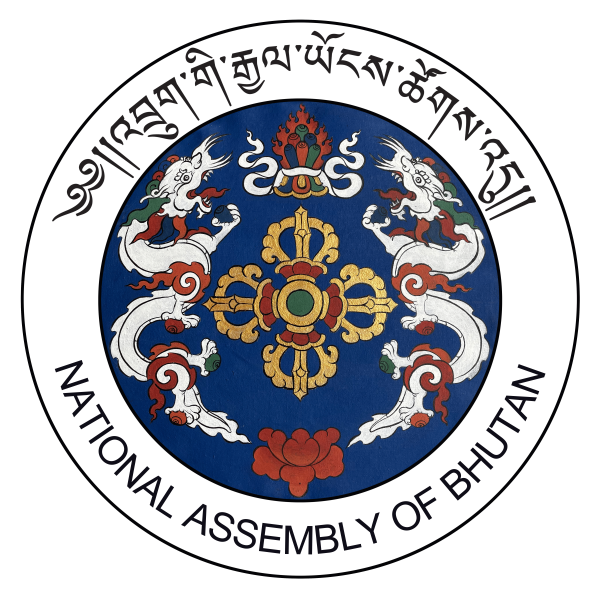
Question Hour Session for Ministries in Group C
At the outset, the Speaker, on behalf of the National Assembly, expressed condolences on the tragic loss of lives in the recent plane crash in Ahmedabad, India. The House offered its prayers for the victims and solidarity to the bereaved families.
In the second round of Question Hour for the Ministers in Group C, four questions for oral responses and one question for written response were tabled in the House. Two oral questions were directed to the Minister for Finance (MoF) and one each oral questions were addressed to the Minister for Foreign Affairs and External Trade (MoFAET) and Minister for Home Affairs (MoHA) and one question for written response was addressed to the Minister for Home Affairs (MoHA).
The Member from Bongo-Chapcha Constituency questioned the Finance Minister on the fairness of the current Resource Allocation Formula (RAF), particularly the standard deviation adjustment. Citing concerns that larger Gewogs with greater population and development needs often receive the same or less budget than smaller ones, the Member urged the Ministry to consider revising the RAF to ensure equitable distribution and address growing disparities in infrastructure and services.
In response, the Finance Minister stated that the Resource Allocation Formula (RAF) was introduced during the time of the First Government, for allocation of the Local Government budget. The RAF was primarily introduced to maintain equitable and strategic allocation of financial and material resources. For that, there are seven criteria based on which the Gewogs are allocated their budgets, such as population density, geographical area, poverty headcount, climate change vulnerability index, GNH indicators, unemployment, and transportation index. Accordingly, budget allocation mainly depends on these criteria and indexes. The inclusion of the standard deviation is mainly to differentiate the variants between the lowest and highest values and to determine an average, which is currently being applied in the 13th FYP. Whereas, in terms of revising the RAF to ensure equitable distribution and address growing disparities in infrastructure and services, the Minister stated that it is currently not possible and the allocation of resources has already been approved under the 13th FYP period, and changes cannot be made.
The Member from Lingmukha-Toedwang Constituency questioned the Finance Minister on the status of the government’s pledge to provide a monthly allowance of Nu.10,000 for the third child under the Sustainable Population Development plan. Highlighting concerns raised by constituents, the Member sought clarification on whether the initiative is still being pursued.
In response, the Finance Minister acknowledged concerns over the declining birth rate and informed the House that the government remains committed to the third child policy. He stated that the government is working on providing a monthly allowance of Nu. 10,000 from the birth of the third child until the child turns three years old. The Minister also mentioned that additional incentives, such as tax reductions for families with multiple children and increased student stipends, are being considered to support population growth.
The Member from Radhi-Sakteng Constituency questioned the Minister for Foreign Affairs and External Trade on the continued toll fee challenges faced by Bhutanese vehicles plying along the Assam and West Bengal highways. The Member highlighted that drivers are subjected to double toll charges and an additional 50% fee when paying in Ngultrum, severely impacting transporters, especially those repaying loans. Citing a previous commitment made during the Second Session to address the issue through diplomatic channels, the Member sought an update on the status and timeline for resolution.
In response, the Minister acknowledged the issue and informed the House that the tolls are levied by the Government of India. The Government of Bhutan has held several consultations the domestic stakeholders as well as with relevant Indian authorities, including the National Highway Authority of India (NHAI), to address the problem. The Indian authorities have agreed to share an approach paper with the government. Upon receipt, we will complete our internal process and take the matter bilaterally with the Government of India. The Minister expressed hope that the necessary procedures will be completed in the coming months to resolve the issue.
The Member from Bji-Kartsho-Uesu Constituency questioned the Minister for Home Affairs on measures being taken to uphold Article 5 (3) of the Constitution, which mandates maintaining a minimum of sixty percent forest cover to conserve natural resources and prevent ecosystem degradation. The Member specifically sought clarification on how the Ministry is addressing forest fire prevention and the formulation of related rules and regulations.
In response, the Minister reported that from 2020 to 2024, around 261 forest fire cases were recorded, significantly affecting wildlife, ecosystems, and efforts to maintain the constitutional mandate of 60% forest cover. The main causes identified include agricultural burning, electrical faults, picnics, and construction activities. Further the Minister stated that to address this, the Prime Minister directed the MoENR and the Ministry of Home Affairs (MoHA) to develop a comprehensive strategy. The Minister informed the House that a high-level committee, chaired by the Minister for Home Affairs and comprising officials from relevant ministries, the Forest Department, Desuung, and the Royal Bhutan Police has been formed and is working on strategic interventions and public awareness campaigns to prevent forest fires.
comment
vote / poll
How should the government react to Bhutanese leaving to Australa ?





